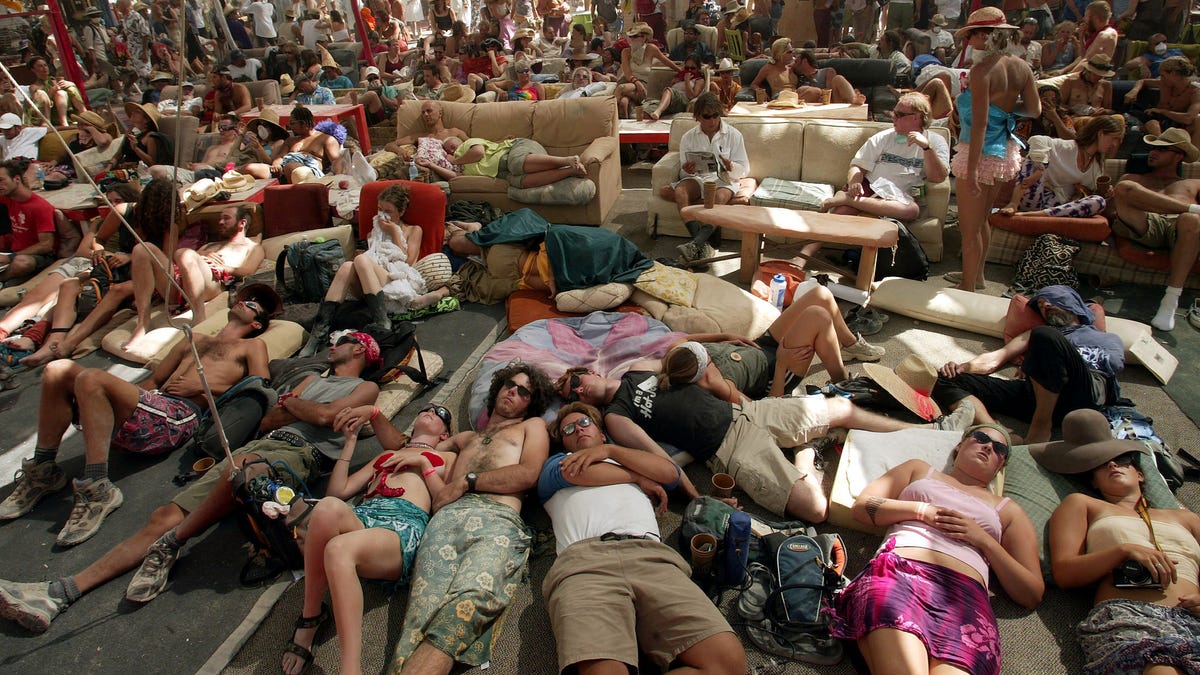
People seek shelter and rest inside the Center Camp Cafe at the Burning Man Festival in Black Rock City, Nevada, August 28, 2003. The Burning Man Festival has been celebrated annually since 1986 and draws around 20,000 people to the Black Rock Desert, celebrating radical self expression. - RTXM6VH
Federal Bureau of Land Management officials are defending their request for special housing accommodations during the annual Burning Man counterculture festival in Nevada, disputing comments by Sen. Harry Reid and others that the plans are unnecessary and extravagant.
Burning Man organizers have refused the request, saying amenities such as flush toilets, washers and dryers, showers, air conditioning and refrigerators at the bureau's on-site camp in the Black Rock Desert would cost $1 million and hike its permit fees to about $5 million.
Gene Seidlitz, the bureau's Winnemucca district manager, said Sunday that the cost of the portable units is being "robustly exaggerated" by organizers. The compound will offer basic amenities only for top agency officials who oversee the quirky art and music festival event held on public land the week leading up to Labor Day, he said.
The number of Bureau of Land Management personnel on hand at the festival has doubled to 160 over the last five years as the peak crowd size has soared to nearly 70,000, he said, and the bureau has run out of places around the nearby town of Gerlach, Nevada, to house employees. Most of the agency's employees stay at a motel or rental properties in the tiny town.
"A lot of folks think we're like participants in that we are out there to enjoy the event and party," Seidlitz told The Associated Press. "But my staff and I have to be rested, well-nourished and accommodated to the bare minimum so we can ensure health, security and safety at the event."
Organizers stand by their cost estimates for the amenities and their position that bureau fee increases have outstripped the festival's crowd growth significantly in recent years, spokesman Jim Graham said.
For example, he said, the crowd for this year's event is expected to grow by only 2,000 participants over last year, yet the agency's infrastructure costs will climb by roughly $500,000 to $1 million.
"They include construction of an entirely new facility, and we maintain they have not considered more cost-effective alternatives," Graham said in a statement. "We look forward to working with BLM on solutions that meet everyone's needs."
After the Reno Gazette-Journal broke the story about the federal agency's demands last week, Reid weighed in with a letter to Interior Department Secretary Sally Jewell. He called the requested accommodations unprecedented, extravagant and "outlandishly unnecessary."
The festival's organizers, who hold the largest special-recreation permit in the country from the bureau, still await a permit to hold this year's gathering near Gerlach, about 110 miles north of Reno.
Seidlitz acknowledged the bureau erred by billing the encampment as a place to house VIPs. Actually, it would only be for 15 to 20 top state and national Bureau of Land Management officials charged with ensuring safety and security and environmental compliance at the festival, he said.
"When you hear 'VIP,' it's like they're coming out on the government dime and bringing out friends," he said. "But I have nowhere to put these senior leaders for a good night's rest. They come out to interact ... and ensure what I'm doing is meeting their intent."
Most will spend no more than a couple of days at the festival, and the compound would save time because of its location only a mile from the festival and not 15 miles away in Gerlach, he added.
The amenities are similar to what the military provides soldiers in Afghanistan and Iraq, and what federal agencies offer crews fighting wildfires, bureau officials said.
The bureau also is asking organizers to provide them mandatory food items for three meals a day and snacks during the festival. The food choices are identical to those provided under a contract with organizers last year, said bureau spokesman Craig Leff in Washington, D.C.
"We have every expectation that these issues will be resolved," he said. "We have very good working relations with (organizers), and we want to continue to have good relations. We're working hard with them to finalize the permit for this year's event."






